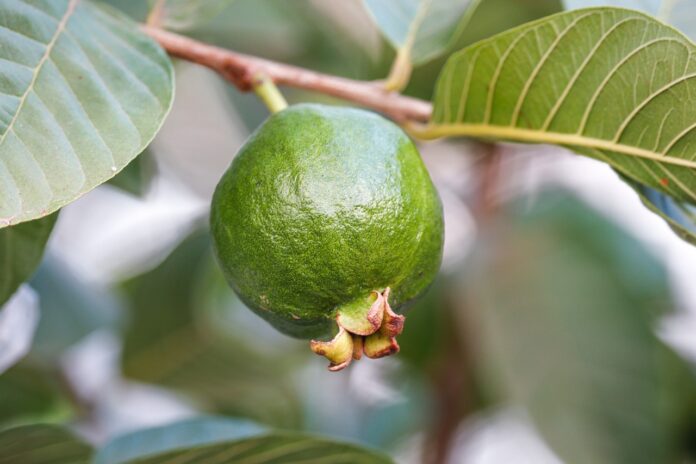Guava is a tropical fruit known for its vibrant color, sweet fragrance, and high nutritional value. Native to Central and South America, guavas are now cultivated worldwide in warm climates, with major production areas in India, Mexico, Thailand, and Brazil. The fruit is round or oval with green, yellow, or maroon skin when ripe, and its flesh ranges from pink to white.
Fascinating Facts About Guava:
- Guava, a tropical and subtropical fruit, grows on small trees that thrive in well-draining, sandy loam soil, with plenty of sunlight and adequate water. Guava trees generally take 2 to 4 years to bear fruit after planting, producing fruit twice a year: in summer and winter.
- India is the world’s top guava producer, contributing over 17.6 million metric tons annually, especially in regions such as Uttar Pradesh, Bihar, and Maharashtra. This variety’s popularity is partly driven by its premium market value, fetching as much as Rs 150 per kilogram. Other leading guava-producing countries include China and Thailand, though they specialize in different varieties.
- The largest guavas on record come from the VNR-Bihi variety, which was developed by Indian farmer Narayan Chawda. This guava is known for its massive size, often weighing between 300 and 850 grams, with some reaching as much as 1,250 grams—approximately the size of a small papaya.
- Vitamin C Powerhouse: Guavas contain over 200% of the daily recommended intake of vitamin C—more than most citrus fruits.
- Weight-Loss Friendly: Low in calories and high in fiber, guavas are a popular choice for those focused on weight management.
- Good for Eye Health: They contain vitamin A, known to support healthy vision.
- Heart Health Benefits: The potassium in guava helps regulate blood pressure, benefiting cardiovascular health.
- Supports Blood Sugar Control: Guavas have properties that can help stabilize blood sugar levels, making them beneficial for people with diabetes.
- Medicinal Uses of Leaves: Guava leaves have antibacterial and anti-inflammatory properties, often used in traditional medicine for wound care and to relieve arthritis symptoms.
- Cultural Significance: In countries like Mexico, guava is a popular ingredient in holiday punch, and its leaves are used medicinally in the Philippines.
- Global Celebrations: Countries like India host festivals celebrating guavas.
- Fast-Growing: Guava trees produce fruit within two to four years of planting and adapt to a range of soil types.
- Pectin-Rich: High pectin content makes guava ideal for making jams, jellies, and preserves.
- Natural Aroma: The fruit emits a strong, sweet fragrance when ripe, often filling a room with its scent.
- Used in Culinary Delights: It’s versatile in the kitchen, used in dishes from salads to desserts.
- Invasive Potential: Guava can become invasive, competing with native plant species in places like the Galapagos Islands.
- Seed Benefits: Guava seeds are rich in iodine and vitamins A, E, and B, and are often eaten for their health benefits.
- Natural Dye: Guava can be used as a natural dye, producing shades from yellow to pink.
- Traditional Toothbrush: In some cultures, guava leaves are used as a natural toothbrush because of their antibacterial qualities.
- Sweet-Sour Rolls: In South Africa, guava pulp is dried and rolled to make guava rolls, a unique snack with a sweet-sour taste.
- Pakistan’s Winter Fruit: Guava is the national winter fruit of Pakistan, with mango being the summer counterpart.
